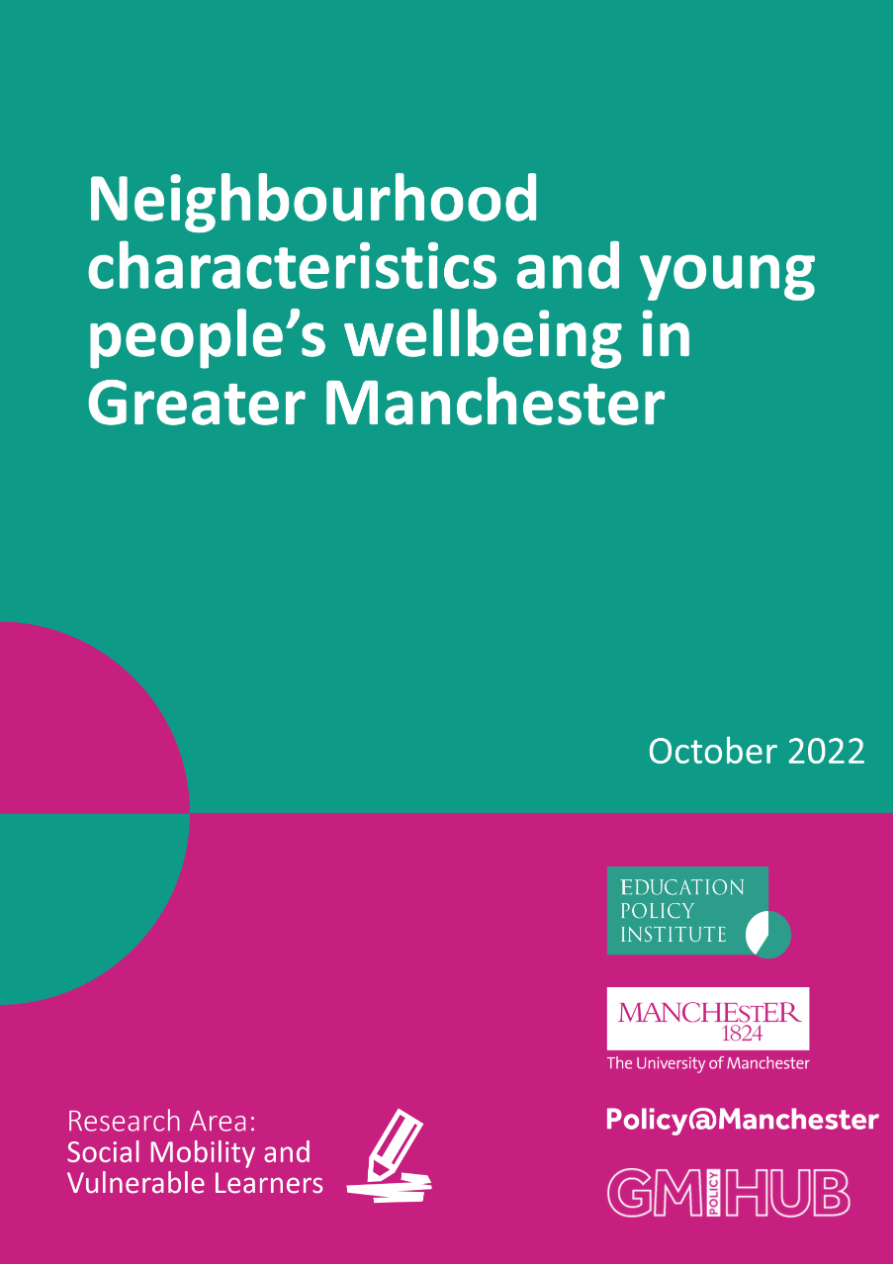Written for Policy@Manchester, this report uses publicly available data to explore neighbourhood trends in young people’s wellbeing, as measured by the #BeeWell programme.
Launched in 2021, the #BeeWell programme includes an annual survey of young people in Greater Manchester which asks a series of questions about different domains and drivers of wellbeing; 37,713 young people in years 8 and 10 (aged 12-13 and 14-15) attending schools in the Greater Manchester Combined Authority completed the #BeeWell survey in 2021/22 and are included in this analysis. Find out more on their work here.
Read the full report here.

Key findings:
Our report finds that neighbourhood characteristics are significantly correlated to different domains or drivers of wellbeing:
- Young people’s wellbeing and affect appear to be slightly negatively affected by higher levels of income disparities in their area, while their life satisfaction is not. Income and health deprivation were not found to be significantly related to wellbeing scores at the neighbourhood level; this could be related to any significant differences at LSOA–level being diluted at a larger, neighbourhood level.
- More health deprived areas were associated with fewer young people reporting good health and more young people reporting experiences of discrimination related to a disability.
- Neighbourhood crime risk was associated with fewer young people reporting they felt safe or that people in their area were trustworthy.
- A higher density of sports facilities was associated with better self–reported physical health, higher engagement with physical activity, and more young people reporting there were things to do in their free time.
- A higher density of charities serving children and young people was weakly related to higher wellbeing at the neighbourhood level.
While correlation is not causation, this analysis provides insight into the direction and strength of the relationship between neighbourhood characteristics and young people’s wellbeing outcomes in Greater Manchester. Combined with the existing literature, these findings suggest that the government should prioritise:
- Ensuring opportunities for physical activity exist in all areas: This is especially important given the impact of the pandemic and stark rise in childhood obesity in the last few years.
- Ensuring that young people feel safe and a sense of belonging in their communities: These findings suggest that young people’s perceptions reflect objective risk, supporting the idea that neighbourhood social capital is an important driver of wellbeing.
- Equitable access to community resources: The findings that access to sports facilities and programmes or support delivered by charities is linked to wellbeing suggests that government should ensure that resources and places for young people to spend time and engage in social and physical activities are accessible across the country.
- Addressing income disparities: While the wider body of evidence is conclusive that low income drives poor childhood outcomes, we find that young people’s perceptions of income disparities are related to low wellbeing. Taken together, the literature suggests that a cross- government child poverty reduction strategy is urgently needed, particularly in the context of the current cost-of-living crisis.
- Further research into the drivers of wellbeing: Given the importance of wellbeing in childhood and adolescence to lifelong outcomes, researchers in and outside of government should further explore how place affects the different aspects of wellbeing, accounting for commonalities between young people in local areas, the impact of different factors at different ages, and long-term effects which stretch into adulthood.
Policy@Manchester aims to impact lives globally, nationally and locally through influencing and challenging policymakers with robust research–informed evidence and ideas.
As The University of Manchester’s policy engagement institute, Policy@Manchester connects researchers with policymakers and influencers, nurtures long–term policy engagement relationships, and seeks to enhance stakeholder understanding of pressing policy challenges.
With more than 6,000 academic and research staff looking into issues ranging from microplastics to nuclear energy, mental health to social inclusion, and antibiotic resistance to advanced cancer treatments, chances are The University of Manchester has the expertise to inform most policy areas.
Within Policy@Manchester, the GM Policy Hub seeks to build relationships between researchers and regional stakeholders to resolve societal challenges and optimise collaborative opportunities across the region. The Hub is a dedicated resource for GM policymakers to access academic expertise to help inform evidence–based policymaking.


